Today, it’s the home of Virginia City’s popular Cafe del Rio restaurant. But back in the 1870s, this two-story brick building at 170 “C” Street housed the grocery store of John S. Werrin, with rooms for rent above. Even today, you can still make out Werrin’s name painted above the door. So just who was this early merchant?
John S. Werrin was born in 1842 in Callington, Cornwall, England. Like so many Cornish miners, he came to the Comstock as a miner. Exactly when he arrived in Virginia City is unclear, but he isn’t listed in the 1870 Census; he may have been in California at the time. Werrin, a newly-wed, married Cecilia Wills in Liskeard, England (not far from Callington) in late 1869 or early 1870, and apparently they emigrated soon thereafter. Their first child, Ernest S. Werrin, was born in California on October 25, 1870.
By 1877, however, Werrin and wife Cecilia had made Virginia City their home. Daughter (named Cecilia, like her mom) died there in March, 1877 at just three and a half years old, and was buried in the Masonic Section at Virginia City’s Silver Terrace cemetery.
Before long, Werrin opened a grocery in this familiar brick building on South “C” Street, between Silver and Flowery Streets. Did Werrin himself build the structure, and when exactly did he move in? Nobody seems to know for sure, but the building is thought to have been built about 1873. (Some say its brick-and-rubble walls suggest a possible construction date after the Great Fire of 1875, though rubble-filled walls were a common building technique.)
Werrin changed locations in mid-1881, relocating his grocery slightly farther south, to the corner of Silver and “C” Streets.
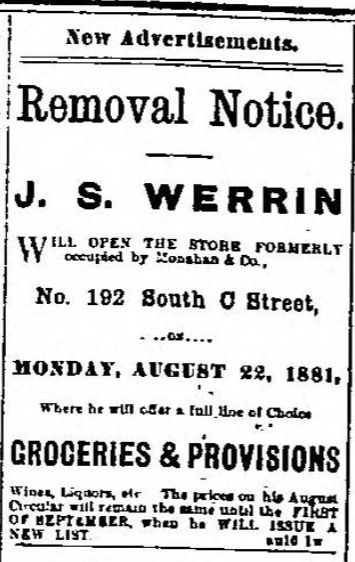
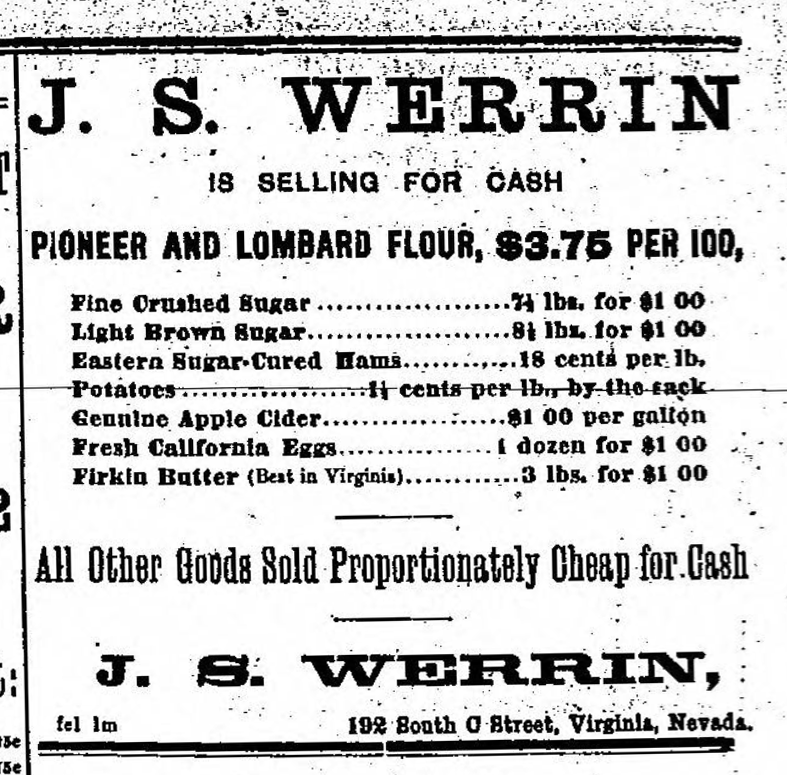
By the Census of 1880, John and Cecilia were living at 130 Howard Street, and had three sons: Ernest (then 9); John (age 2); and 5-month-old Samuel, born just that January. Sadly, the family would soon lose baby Samuel, too; he died from encephalitis in October, 1880, at nine months of age, and was buried at Silver Terrace with his sister. But the family’s sorrow was soon leavened with new joy: fourth son, Wellington, would be born in July, 1881.
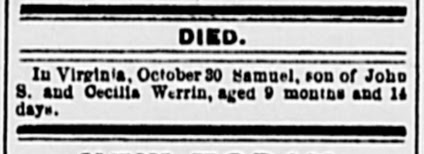
It must have been a challenge for the parents to keep an eye on their three growing boys in a rough-and-tumble mining town. Five-year-old Johnnie had a near brush with disaster in 1883 after removing a board from an old mine chute and tumbling to the bottom. Luckily, a friend with a ladder was all it took to rescue him.
By 1883, Werrin had become a prominent man in town. Elected to the County Commission, he and a fellow commissioner “inaugurated an era of reform” in Storey County, dispensing with the services of “several useless officials” and making changes to the City offices – applying a fiscal “pruning knife” on behalf of the citizens.
But a whiff of scandal soon followed. In 1884 a whistleblower accused Werrin of using his post as commissioner to line his own pockets. Jail officials, he said, were “compelled” to buy all food to feed prisoners from Werrin’s store – a clear conflict of interest. Perhaps there was more to the story, however, as Werrin not only remained on the Commission but by 1886 was serving as chairman.
Soon, he was looking for larger quarters for his grocery. In January, 1884, he bought the old “Silver Palace” property just up the street at 130 “C” Street – a somewhat more central location just north of Flowery, with adjacent buildings offering him an “unlimited amount of storage room.”
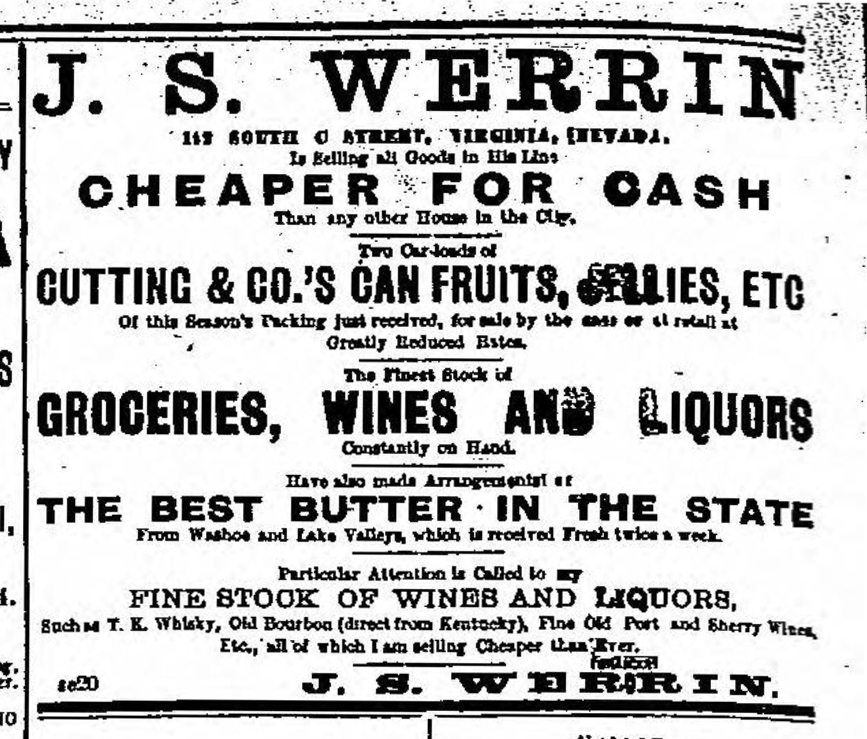
It was evidently a good move, and his fortunes continued to soar. By August, 1884, he was buying “another fine large ranch” near Reno, where he hoped to raise everything from chickens to stallions. He invested $8,500 in another ranch near Wabuska in March, 1887, and that August, was having a “fine residence” erected for himself on his Reno property. And that October, 1887, he was having two “large cottages” built on South C Street, using materials recycled from a boarding house near the Ophir.
Clearly he was now a man of means — and a target for less-savory characters. Burglars attempted to crack the safe at Werrin’s Virginia City grocery in April, 1886. Luckily for Werrin, they were frightened off by the town watchman.
John Werrin died on October 9, 1890 at Virginia City, of “typhoid pneumonia.” While he’d been sick for several days, no one had expected his illness to be fatal. As the local paper noted, one day before he died Werrin “got out of his sick bed and went to his store to see that his business was going on all right, which it was anyhow. But it was really this abnormal anxiety about his business that was the immediate cause of his death.”
Werrin’s son, Ernest was at his bedside when he passed, arriving in the nick of time. Ernest had been attending business college in California and upon receiving word came as quickly as he could. The train from Reno was delayed by a heavy snowstorm, but he forged through in a private wagon, arriving just an hour before his father passed away.
John Werrin was just 49 years old, but left behind quite a legacy. As his obituary put it, he’d made “strong friends and strong enemies, but many a poor family remembers Johnny Werrin’s charitable kindness.” He was not only a member of the local Masonic chapter, but also a member of the Odd Fellows, Sons of St. George, and Company A of the National Guard. Werrin may have arrived in Virginia City virtually penniless, but by the time of his death he’d amassed an astonishing $100,000 in property — equivalent to $3 million today.
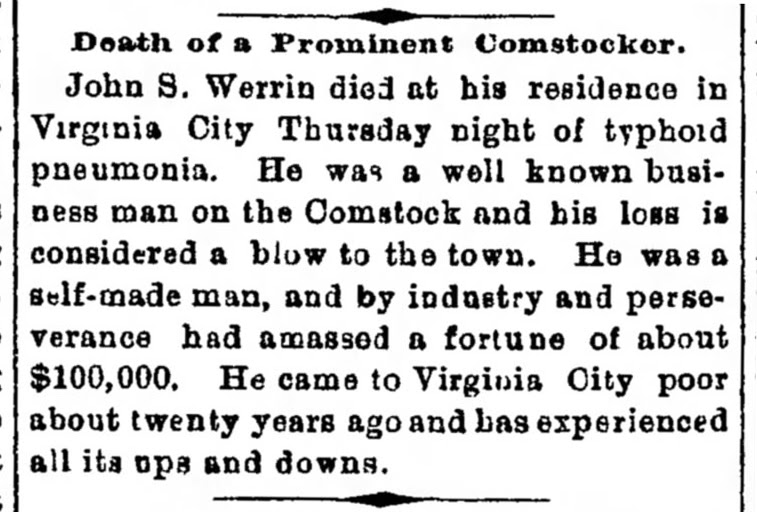
A series of tragedies soon followed. Adding insult to injury for the bereaved family, in 1891 the Internal Revenue Service confiscated the “brewery and saloon” owned by Werrin’s estate (managed by a man named Schroeder)) for “selling unstamped beer.”
Werrin’s oldest son Ernest apparently had a hand in several business during his short life. At one point he tried selling a “patent incubator,” for example, but discontinued that effort in 1884. After his father’s death in 1890, Ernest seems to have hit even rougher times. In May, 1892, he was sued by Thomas and Julia H. Rowe for $10,000 in damages for slander in the District Court at Virginia City.
Perhaps that was the last straw. Just before Christmas, 1893, Ernest “entered his place of business” (possibly his father’s saloon), requested a glass of water, and emptied something from a vial of liquid into it. After draining the glass, he sat back and “coolly lit a cigarette.”
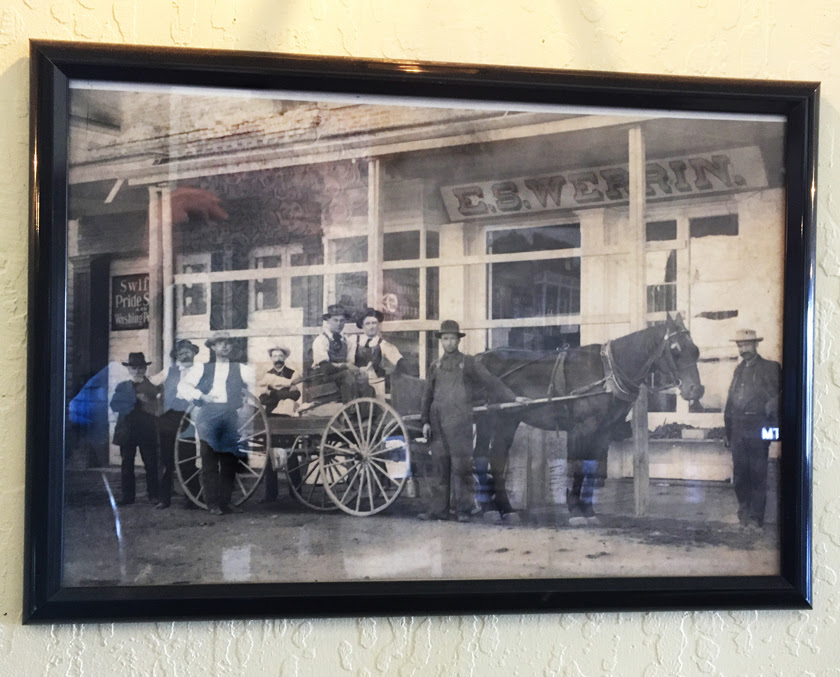
After determining that the mysterious vial had contained morphine, friends summoned physicians. But by then, Ernest had collapsed. Although his stomach was pumped and “powerful electric batteries” applied as a stimulant, Ernest he remained unconscious. Just after midnight that night, he slipped away. He was just 23.
The precipitating factor for his rash act is unclear. Ernest had married Celia Crowley just two months before he died. But he’d also just lost his father a few years before, and been embroiled in a lawsuit. And the Mason Valley paper described him as a “fast young merchant” – suggesting he may have led a bit of a wild life. Ernest, too, was laid to rest in the Masonic Section of the cemetery.
A happier fate – at least for a time — awaited younger son John Werrin. In May, 1900, he wed “one of Virginia’s belles,” 24-year-old Beatrice Lawrence, at her father’s home “on the Divide.” Sadly, Beatrice would die in childbirth the following year. You can visit her grave as well in the Werrin family plot. And youngest son, Wellington Werrin, would die of pneumonia in 1907, at the age of 25.
As for John senior’s widow, Cecilia, she would marry again, and live to the ripe old age of 84 before passing away of pneumonia in 1931. She, too, is here at Silver Terrace.

John Werrin’s legacy, of course, still remains in the form of his original grocery store at the south end of C Street, with his name painted over the door. As years the passed after his death, the building fell into disrepair and became abandoned. Finally, in 2004, it was purchased by Brian and Ardi Shaw. After two years of renovations, it became the home of the popular Del Rio restaurant.
And today, if you visit, you can still enjoy some of the building’s original stone and masonry construction and imagine merchant John Werrin once standing inside.
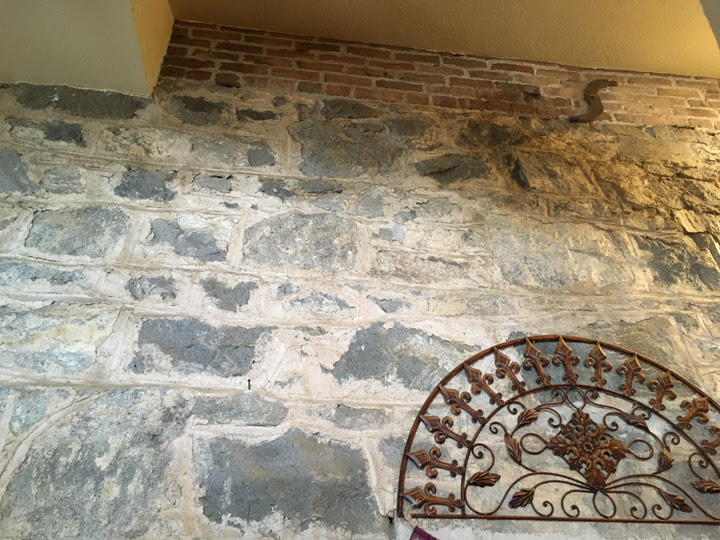
__________
Note: The street numbering has changed since Werrin’s day; today, Cafe Del Rio is at 394 S. “C” Street in Virginia City.
The touching story of Ernest Werrin’s suicide is one of the tales in the wonderful audio walking tour of the Silver Terrace cemetery! You can listen here: https://tinyurl.com/b7u88ja5
